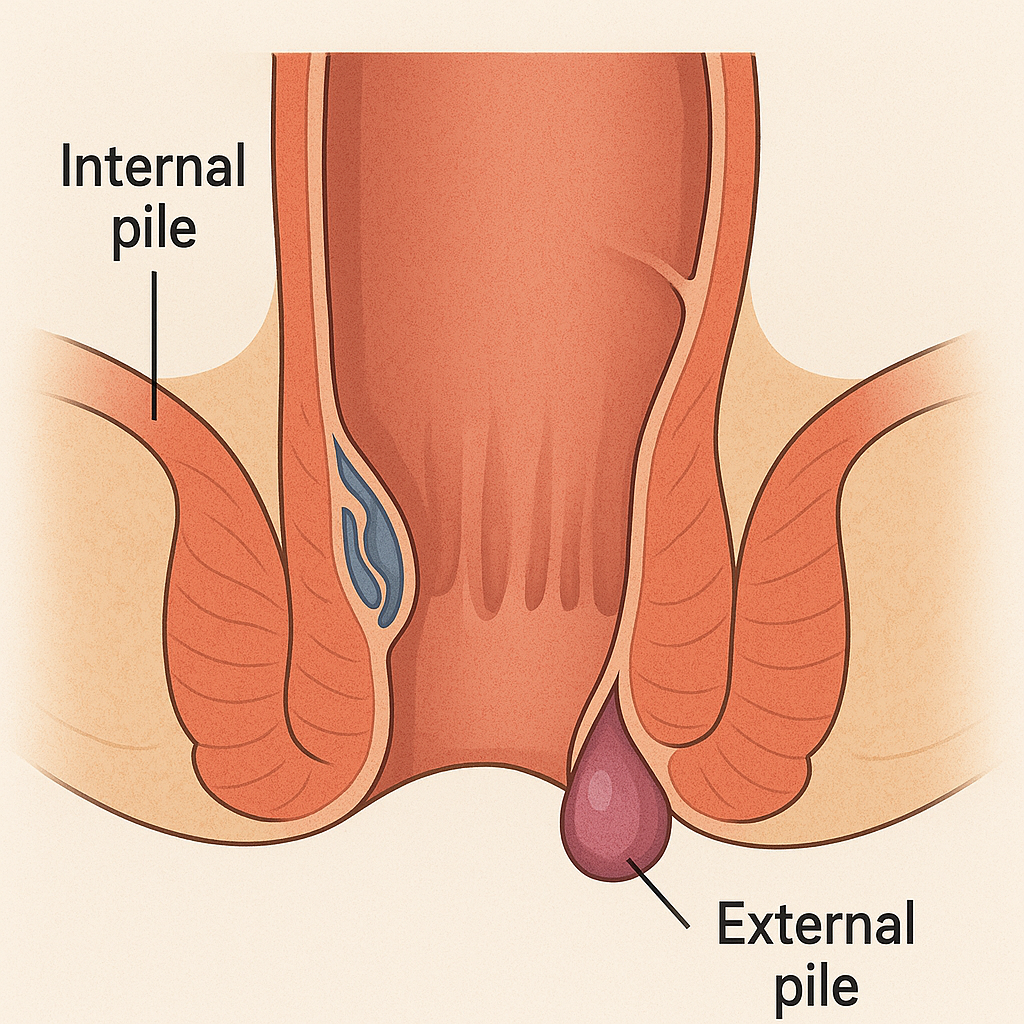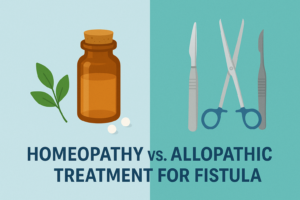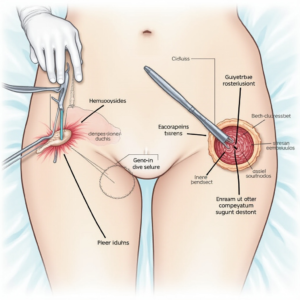Have you ever experienced pain while passing stool or noticed blood after a bowel movement? While it may seem embarrassing, you’re not alone. One of the most common reasons behind such discomfort is a condition called piles, also known as hemorrhoids.
In this blog, we’ll explore what piles are, the different types, common causes, and stages of piles, so you can understand the condition better and take early steps toward healing.
What Are Piles?
Piles, medically known as hemorrhoids, are swollen blood vessels in the lower rectum and anus. These veins become enlarged and inflamed due to increased pressure, similar to varicose veins in the legs.
Think of them as cushions of tissue filled with blood vessels, muscle, and elastic fibers. When these cushions become enlarged, they can cause symptoms like pain, bleeding, itching, or discomfort during bowel movements.
Piles can affect anyone—men and women of any age—but are most common between the ages of 30 and 60.
Types of Piles
Piles are generally categorized into two types based on their location:
- Internal Piles
- These are located inside the rectum and are usually not visible externally.
- Internal piles often do not cause pain, but they may lead to painless bleeding during bowel movements.
- In more severe cases, they may prolapse—meaning they slide out of the anus while straining but can go back in on their own or with help.
- External Piles
- Found under the skin around the anus, these are more likely to be painful.
- You might notice a lump near your anus or experience itching, discomfort, or swelling.
- In some cases, blood may pool and form a clot (thrombosed piles), which can be extremely painful.
Some individuals may suffer from both internal and external piles simultaneously.
Causes of Piles
Piles usually develop due to increased pressure in the rectal veins. Several common causes contribute to this pressure:
- Constipation and Straining
Chronic constipation is one of the leading causes of piles. Straining during bowel movements puts excessive pressure on rectal veins.
- Prolonged Sitting
Spending long periods sitting, especially on the toilet, can increase the risk of developing piles.
- Pregnancy
The growing uterus puts pressure on the veins in the rectum, and hormonal changes can also lead to piles in pregnant women.
- Obesity
Excess body weight increases abdominal pressure, which can contribute to the formation of hemorrhoids.
- Low-Fiber Diet
A diet low in fiber leads to hard stools and constipation, forcing you to strain during bowel movements.
- Aging
As we age, the tissues supporting the veins in the rectum and anus tend to weaken, increasing the risk of piles.
- Heavy Lifting
People who regularly lift heavy weights, either at the gym or at work, may develop piles due to repetitive strain on the rectal area.
Stages of Piles
Internal piles are classified into four grades based on the severity of prolapse:
Grade 1:
- The piles are not visible and remain inside the rectum.
- Symptoms may include occasional bleeding, especially during straining.
Grade 2:
- Piles may prolapse outside the anus during bowel movements but retract on their own.
- Symptoms might include discomfort, itching, and mild bleeding.
Grade 3:
- Prolapsed piles that do not go back in automatically and need to be manually pushed back.
- There may be more intense pain, swelling, and bleeding.
Grade 4:
- Piles are permanently prolapsed and cannot be pushed back inside.
- They are often very painful, swollen, and may be thrombosed.
- This stage may require surgical or procedural intervention.
External piles do not follow this staging system but can be thrombosed or non-thrombosed, depending on whether a blood clot is present.
Common Symptoms of Piles
Here are the key signs that may indicate the presence of piles:
- Bright red bleeding during or after bowel movements
- A lump or swelling around the anus
- Pain or discomfort while sitting
- Itching or irritation in the anal region
- Mucus discharge from the anus
- A feeling of incomplete evacuation after passing stool
While not all piles are painful, any of these symptoms should prompt you to consult a doctor—especially if the bleeding persists.
Who Is at Risk?
Certain factors increase the likelihood of developing piles:
- A family history of hemorrhoids
- Sedentary lifestyle or desk jobs
- Low water intake
- Lack of fiber in the diet
- Chronic constipation or diarrhea
- Being overweight or obese
- Being pregnant
Being aware of these risk factors can help you take proactive measures.
Homeopathy and the Expertise of Dr. Rashmi Chandwani
When it comes to gentle, non-invasive, and lasting relief from piles, many patients are turning to homeopathy—a holistic approach that treats not just the symptoms but the root cause of the problem. Dr. Rashmi Chandwani, a well-known homeopathic physician with years of experience in treating piles and other chronic conditions, offers personalized care tailored to each patient’s constitution and lifestyle. Her approach goes beyond just relieving pain—it focuses on regulating digestion, improving bowel habits, and strengthening the venous system naturally. With a deep understanding of both the physical and emotional toll piles can take, Dr. Chandwani offers compassionate, patient-centered care that helps people heal from within—without surgery or harsh medications.
Final Thoughts
So, what are piles? They’re more common than you think—and entirely treatable when addressed early and correctly. From understanding the types, causes, and stages to identifying the right treatment plan, awareness is your first step toward recovery.
If you’re experiencing symptoms of piles or have been silently suffering, know that help is available—and healing is possible. Don’t wait until the pain or discomfort worsens.
Book a consultation with Dr. Rashmi Chandwani today and discover how homeopathy can offer you long-term, side-effect-free relief from piles. Your path to pain-free living and digestive wellness could start with just one appointment.




